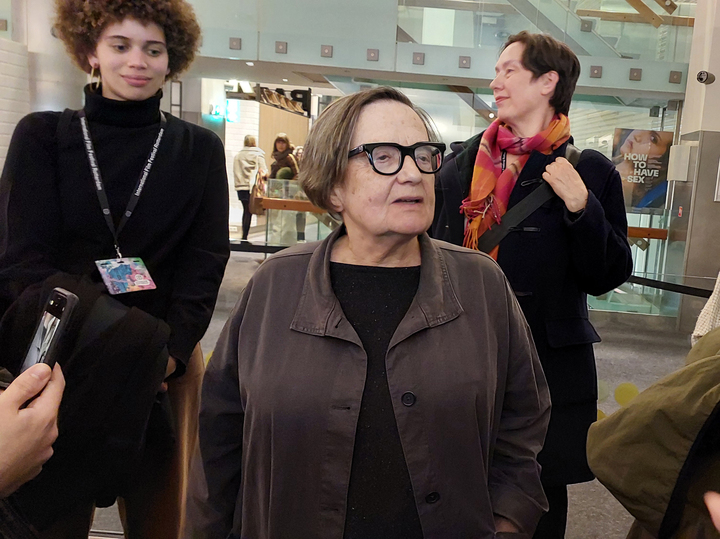Films that frightened politicians and the church were shown at the Rotterdam Film Festival
[ad_1]
At the Rotterdam International Festival of Debut, Author and Experimental Film, held in the Netherlands, in addition to the works of novice filmmakers, films by masters are shown. This sets a bar that young directors are still far from reaching, and some will never reach.
Moreover, regardless of the status of the authors, all films participate in the general audience vote. Its results are updated every day. So far, the leader is “Green Border” by 75-year-old Polish director Agnieszka Holland, who has lived in Prague for a long time. Her film was created in co-production in Poland, the Czech Republic, Belgium, France and other countries. 84-year-old Italian master Marco Bellocchio came with the film “Kidnapped” (Italy-France-Germany) and ended up only in 22nd place in the audience rating. Although his picture is an order of magnitude higher than some of the opuses that have taken the lead.
Both films are about the fragility of human life, violence from the state or church. Holland and Bellocchio have reached that venerable age when there is nothing to be afraid of. Their films frightened the powers that be and provoked scandals.
Agnieszka Holland has headed the European Film Academy since 2021, replacing Wim Wenders as president. She worked with Wajda and Kieslowski, achieved a lot in the profession, but is so democratic that in the crowd she cannot be distinguished from volunteers – Rotterdam pensioners. In Europe they are often attracted to work. It’s our students who work at festivals. “I’m glad to be in Holland. My name is Agnieszka Holland,” this is how the author of “Green Border” addressed the audience. And after the show they greeted her standing. This was the first time I had seen something like this in 20 years of being at the festival.

“Green Border,” which has already received a special prize at the Venice Festival, has caused discontent among Polish politicians because it unflatteringly shows recent events on the Belarusian-Polish border, where the concentration of migrants from Syria and Afghanistan has exceeded all norms. Polish President Andrzej Duda spoke harshly about the film.
A large family from Syria with small children is flying to Minsk. Their traveling companion is a teacher from Afghanistan. They dream of going to Europe. To do this, you just need to cross the border. And then all hell breaks loose. Refugees are robbed and beaten on both sides of the border. They are sold a bottle of water for 50 euros and sent on a signal, and then returned many times from the territory of one country to the neighboring one. Border guards raise the barbed wire, push the sufferers into Poland, and then back, and so on for days. They are treated as an inferior race because they are people of color. Often very young people enjoy the opportunity to humiliate another. A Polish border guard (played by Tomasz Wlosok) is expecting the birth of a child, takes care of his pregnant wife, who sees a video on his phone where her husband is cruel to the elderly, children, pregnant women…
Refugees can only expect sympathy and help from volunteers, but they also have little opportunity to avoid being put in the dock themselves. Volunteers can only bring dry clothes, sleeping bags, medicine, and food. The caring heroine Julia was played by the magnificent Polish actress Maja Ostaszewska, known for the films “Katyn” by Andrzej Wajda, “Schindler’s List” by Steven Spielberg, “The Pianist” by Roman Polanski, “The Body” and “There Will Be No More Snow” by Małgorzata Szumowska, “Loneliness on the Net” Witold Adamek. During Covid, Julia’s husband died, and she is determined to save people while others prefer to pretend that nothing is happening. Syrian refugees hope for a happy outcome and lose those closest to them. Europe is not heaven on earth, but something still depends on the indifference of people.
The picture is black and white, except for a few frames. It is like a chronicle, a merciless testimony of time. In the finale, Holland shows the Ukrainian-Polish border, where in February 2022 there were also queues, but the attitude towards people is completely different, because they are white.
“Kidnapped” by Marco Bellocchio, which disturbed the church, and not only in Italy, is also based on real events that Steven Spielberg became interested in at one time, but the film was never made. This is the story of priest Edgardo Martar, who was taken from his Jewish parents as a child in the 1850s and placed under the care of Pope Pius IX. And he, wanting good, shows cruelty, feels omnipotent, forgetting that any power is finite. Since in early childhood a Jewish child was secretly and without permission baptized by a maid, now they want to make him a real Catholic – and they will do it. The boy is so scared that he has a dream in which he frees Jesus and he comes down from the cross. As an adult, he will use his tongue to draw a cross on the floor of the church, and will tell his dying Jewish mother about the need to choose Catholicism.
The success of “Kidnapped” is largely due to the leading actor – the touching young actor Enya Sala. Bellocchio’s film resembles an old painting. It’s amazing that at his considerable age, the director is able to create such a large-scale film. He did not intend to make an anti-Catholic film, but wanted to explore the relationship between faith and church dogmas, which he spoke about in Rotterdam. His own sympathies are with the child who finds himself hostage to religious violence.
Newspaper headline:
The director is like a pensioner. Nothing to lose
[ad_2]
Source link






